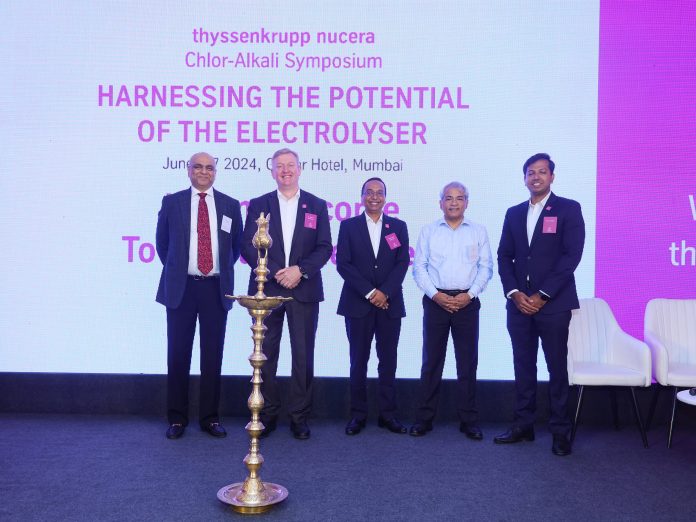“We aim to be the number one provider of electrolyzers globally,” said Vaidyanathan Nagarajan, Managing Director of thyssenkrupp nucera, in his opening remarks at the company’s tenth Chlor-Alkali Symposium. He emphasized the company’s commitment to sustainability and decarbonization and highlighted the contributions of the company’s core teams to its success.
The symposium, held in Mumbai on June 6-7, attracted over 130 delegates, fostering collaboration among customers, vendors, associates, and group companies under the theme ‘Harnessing the Potential of the Electrolyzer’.
Dr. Roland Beckmann, Head of Chlor-Alkali at thyssenkrupp nucera, initiated the Business Session by reflecting on his experience at a waste treatment plant in India. He described thyssenkrupp as a global leader in electrolysis expertise.
In his address, Jayant Dhobley, CEO and Business Head of Global Chemicals, Fashion Yarn & Insulators at Aditya Birla Group, described the chlor-alkali industry as both magical and challenging. He highlighted the industry’s ability to transform basic elements into essential chemical building blocks while underscoring the safety challenges in handling toxic chlorine gas.
Stefan Karrenbrock, Head of Global Sales CA at thyssenkrupp nucera, presented on the global chlor-alkali market. He emphasized the urgency of decarbonization and renewable energy, noting the global shift towards membrane technology over traditional methods like diaphragms and mercury.
Keisho Cho, Managing Director, thyssenkrupp Uhde Chlorine Engineers (Shanghai), detailedthe chlor-alkali market in China, noting that China with over 150 companies is the largest producer due to high PVC demand.
Manish Bhoslay, Vice President Sales Business Development at thyssenkrupp nucera, provided insights into the Indian chlor-alkali market. He indicated a paradigm shift with India potentially transitioning from an importer to a major exporter, particularly to African countries.
He highlighted the growing demand for caustic soda in industries such as alumina, textiles, paper, chemicals, and soap and detergent, while noting high power costs and price volatility as challenges.
Bhoslay mentioned that the chlorine market is growing at a 3% CAGR, driven by population growth and an expanding middle class, with significant future demand expected from the PVC, semiconductor, and solar industries. He concluded by emphasizing chlorine’s crucial role in India’s caustic soda growth.































